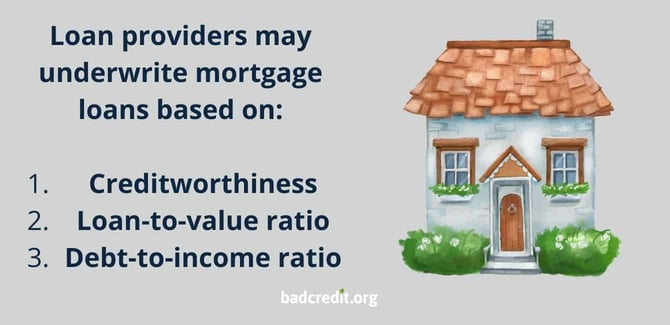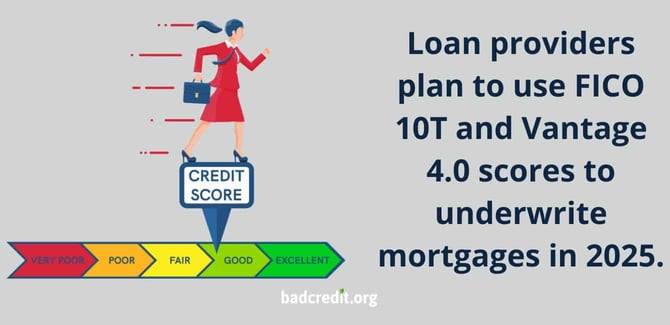
The world of mortgage interest rates has been on quite the roller coaster over the last few years. Mortgage interest rates for garden-variety 30-year fixed rate mortgages went from about 3.75% a few years ago to about 2.7% soon after COVID, and over 7% in 2023. The interest rate of your mortgage loan is highly influential in determining your monthly payment.
But guess what’s highly influential in determining your interest rate…your credit scores.
Credit Scores are an Indicator of Repayment
Simply put, your credit scores are used by lenders to determine the odds that you’ll pay them back. The better your credit scores, the greater the likelihood that you will repay your lender in a timely fashion. The lower your credit scores, the greater the likelihood that you will not repay your lender in a timely fashion, or that you won’t pay them back at all.
This is why credit scores are so influential to interest rates on mortgage loans. If the lender or investor is comfortable with you as a borrower, they don’t assume as much risk doing business with you. If the lender is less comfortable with you as a borrower because they anticipate taking on more lending risk, they’re going to want to subsidize that risk by charging you more money in interest. That’s risk-based pricing 101.
What is Influential to a Mortgage Loan?
Mortgage loans are very different from any other type of loan or extension of credit. First off, your mortgage is likely going to be the largest extension of credit you’ll ever take. According to Redfin, the median price of a home in late 2023 was $412,000. Of course, that’s going to vary wildly by what is the most important variable in determining the price of a home: location, location, and location.
Mortgage loans are commonly underwritten based on at least three factors: your creditworthiness, the value of the home relative to the loan amount (formally, “loan-to-value” ratio or “LTV”), and your capacity to make the loan payments (formally, “debt-to-income” ratio or “DTI”).
So if you’ve been approved for a mortgage loan you did well enough in each of these three factors. If you’ve been denied a mortgage loan, you may have performed poorly in one or more.

Focusing specifically on credit scores, when you apply for a mortgage loan, the broker or lender is currently required by the Federal Housing Finance Agency (or “FHFA”) to pull all three of your FICO credit scores and then use the middle numeric score to make the decision.
This practice has nothing at all to do with your mortgage broker but has everything to do with Fannie Mae and Freddie Mac policies, as those companies guarantee the majority of mortgage loans in the United States. And, if you guarantee mortgage loans, then you get to set the rules for underwriting.
While it’s possible to get a mortgage loan with poor credit scores, generally, applicants have to have at least a middle numeric FICO score at or above 620. Anything below 620 and you’re going to have to use a specialty mortgage program such as an FHA mortgage loan, which allows applicants to have FICO scores as low as 500.
To give you a sense of what it means to have FICO scores at 500 or even 620, the average FICO score as of April 2023 was 718, the highest recorded average ever. So, you can see just how far below average you can score and still have options for a mortgage loan.
Changes are Coming in 2025
The same FICO credit scores have been used in mortgage lending for over 20 years, thanks to the FHFA taking an extraordinary (and embarrassing) amount of time to transition to newer versions of the scoring software, something your credit card issuers can do in a few months. In 2025, assuming all goes as planned, your mortgage will be underwritten using FICO 10T scores and VantageScore 4.0 scores. I wrote about the upgrade to the scores used for mortgage lending here.
Not much will change from the applicant’s perspective. You’ll still have to score well enough to qualify. And you’ll have to make enough money to comfortably afford your monthly payment. The value of the home will almost certainly have to be more than the amount you borrow. If all of these things are in line, you should be able to qualify for a mortgage loan.

Of course, the cost of that future loan is unknown at this point. Mortgage interest rates move constantly. Up one week, down the next, and so on. In the perfect world, the next time you apply for a mortgage loan or want to refinance an existing mortgage loan, the rates will be on a downward trajectory. Other than the size of the amount of your loan, your interest rate is the largest driver of your monthly payment.
Here’s a real example so you can see just how meaningful the interest rate is to your monthly payment. If you currently have FICO scores above 760 across the board at all three of the credit bureaus, the average APR (annual percentage rate) is 6.7%. If you currently have FICO scores that all fall between 620 and 639, the average APR is 8.3%1.
For the same house purchased for the same amount of money (let’s say $500,000) and both financed with the same 30-year fixed rate mortgage loan, the difference in monthly payment would be $543 and almost $200,000 over the life of your loan. The point being, having poor credit is really expensive!
How to Get Your Credit Scores
If you don’t know what your scores are, don’t worry. It’s very easy to get free FICO and VantageScore credit scores these days. There’s no shortage of credit card issuers and banks that will give away free FICO scores to their borrowers. There are also numerous websites that will give away either FICO scores or VantageScore credit scores.
Just be sure to look for the branding of the score on the website so you can be certain the score you’re seeing has relevance in the world of borrowing.
In your search for scores, you may also come across websites that want to charge you for your scores. If you want to use a fee-based approach, then that’s fine. Adults get to make adult decisions with their money. Just keep in mind there are a lot of places to get credit scores, and credit reports, for free.
1These figures were accurate as of March 1, 2024, and are subject to change.






